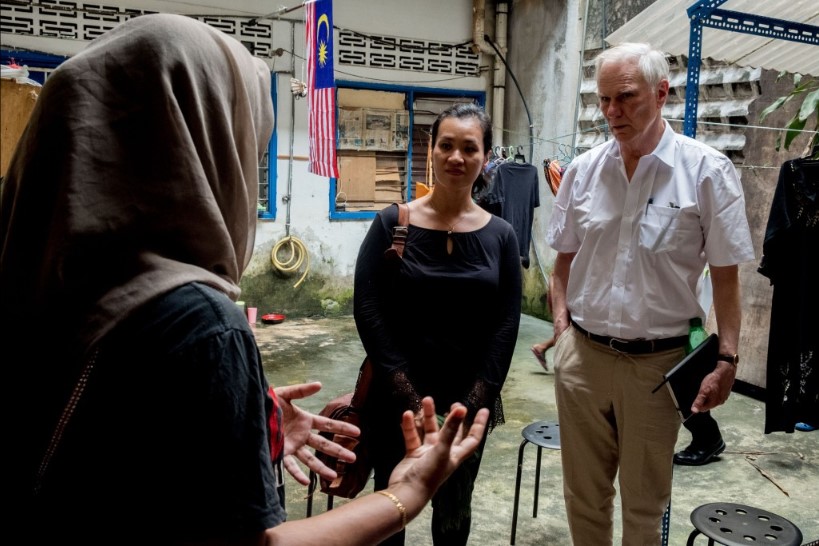KUALA LUMPUR, August 23 — Malaysia’s two-tiered health care system is polarised by socioeconomic status, as poorer families patronise government facilities while higher-income households comprise two-thirds of visits to private centres, a United Nations (UN) expert said.
Philip Alston, the UN Special Rapporteur on extreme poverty and human rights, said at the end of his 11-day visit to Malaysia that 70 per cent of specialists were estimated to be in the more expensive private health care system, mostly concentrated in wealthier areas, that treats just 30 per cent of complicated cases.
“This lopsided allocation creates shortages of critical staff in an overburdened public health care system and has contributed to ‘rising incidences of overcrowding, long waiting times, delayed consultation and late admission for emergency cases’ there,” Alston said in a report about his mission to Malaysia from last August 13 to 23.
Another issue addressed by Alston was access in Malaysia to health services, medicines and vaccines in rural areas.
“A third of rural households in Sabah and 43.6 percent in Sarawak are more than 9km from a public health center. And villagers need to go much further to a hospital for any serious medical issue.
“In the outskirts of Kota Bharu, I met with a family forced to forgo picking up free medicine for their child with cerebral palsy because they could not afford transportation,” he said.
Malaysia, added Alston, should strongly consider legislating a national right to health care to cement its commitment to ensuring every household is able to access the highest standard of physical and mental health.
Alston said indigenous people reported exclusion from social services like education and health care, with many telling him that they dropped out of school because of irrelevant or inaccessible instruction, alleged attempted religious conversion, or corporal punishment and discrimination.
He also met Orang Asli women who described an “appallingly authoritarian approach by health authorities”,’ including “several” women who alleged that they were forced to receive unwanted birth control injections or implants against their will.
“One woman explained that she had to beg the doctors to remove a painful implant that prevented her from carrying out her daily tasks, and that it cost her the equivalent of a month’s worth of household expenditure in order to remove it,” said the UN human rights expert.
The Health Ministry announced last month that it has set up an internal inquiry to probe allegations brought to Parliament by Orang Asli women from Hulu Perak, Perak, who accused health officials of coercing them into taking birth control shots. The ministry has yet to release the results of its investigation.
Alston called for comprehensive new policies for indigenous people, whom he said suffered the highest overall poverty rates in Malaysia and desperately needed better protection of their customary land rights and more effective access to quality health and educational services.
The UN human rights expert observed that migrant workers were also excluded from many social services like health care.
He pointed out that migrant workers with legal status were charged a “foreigner” rate at public health facilities that was up to 40 times what a Malaysian citizen paid, while irregular migrants reported avoiding government health centres altogether due to document checks and potential involvement of immigration authorities.
“The government confirmed to me that undocumented people receiving treatment would subsequently be detained and deported,” he said.
He added that refugees and asylum seekers should be permitted to work, their children admitted to public schools, and they should be eligible for public health care.
Alston also said lesbian, gay, bisexual, transgender, queer, and intersex (LGBTQI) people were often overrepresented among people in poverty because of “persistent stigmatisation and discrimination”.
“Research in Selangor and Kuala Lumpur shows that transgender people face considerable challenges in accessing basic services like health care and education, and experience employment discrimination that could have long-term socioeconomic implications.”
The UN Special Rapporteur travelled to Kuala Lumpur, Selangor, Sarawak, Sabah, and Kelantan during his visit to Malaysia, meeting state and federal government officials, international agencies, civil society, academics, and people affected by poverty in urban and rural areas.
Alston refuted Malaysia’s claim of all but eradicating poverty, saying millions of families are scraping by on very low incomes.
He said the monthly RM980 poverty line underpinning Malaysia’s official 0.4 per cent national poverty rate, or less than 25,000 households, was a “very low and highly unrealistic poverty line”.








